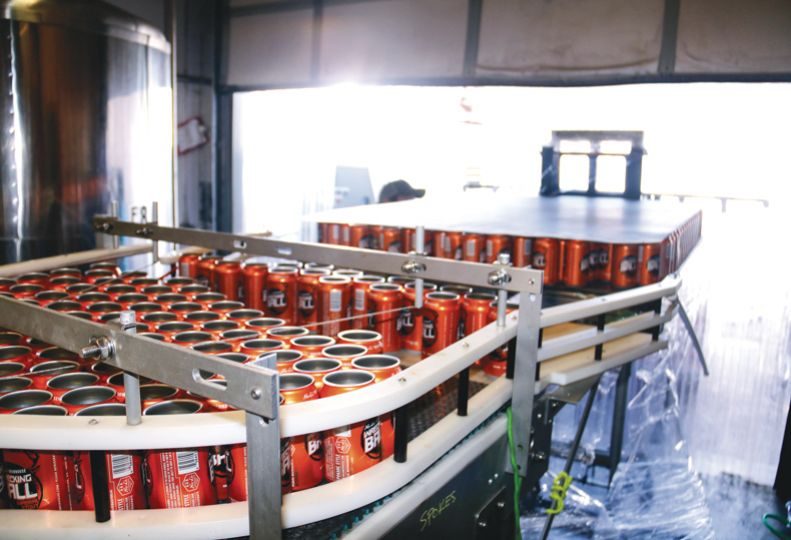
Home » Strained brew
Strained brew
Aluminum can prices rise, lead times double for No-Li Brewhouse in height of busy season

July 19, 2018
Trouble might be bubbling in the brewing industry, on both local and national scales.
Since May, prices for aluminum cans have risen 20 percent for No-Li Brewhouse LLC, and the time between ordering and receiving aluminum cans from suppliers have roughly doubled in the past two weeks, says owner John Bryant.
Typically, an order of aluminum cans to No-Li would take between three and five weeks, says Bryant.
“Right now, it might go anywhere from eight to 10,” he says.
Until recently, the price of aluminum cans has stayed relatively stable since No-Li started offering canned beverages in 2015, he says.
Other brewers, suppliers, distributors, and a soda brand couldn’t be reached immediately for comment.
Bryant declined to disclose No-Li Brewhouse’s aluminum can provider.
The aluminum demand is a national-scale issue, Bryant asserts.
Recently implemented aluminum tariffs might be affecting costs, he says.
The Beer Institute, a Washington D.C.-based national trade association, predicts a 10 percent aluminum tariff will cost more than 20,000 jobs, tax $247 million on brewers, and “create uncertainty in the supply chain for all users, limiting growth and stymieing further investment,” its website says.
The $350 billion beer industry in the U.S. is comprised of more than 5,000 breweries providing more than 2.2 million jobs, says the institute’s website.
A 20 percent increase in aluminum can costs aligns with increases reported in a story in the Journal last month on construction material demand. As of the end of May, milled aluminum costs within the construction industry rose 17.3 percent from May 2017. Those numbers don’t reflect steel and aluminum tariffs imposed on imports from Canada, Mexico, and the European Union.
Bryant says other factors could be affecting the costs as well. For example, canned beverages see higher demand in the summer, so seasonal increases have a play in pricing and lead times. Larger beverage companies also produce summer-specific drinks and need more aluminum cans this time of year, potentially straining distributors. Those companies probably won’t be affected by the shortage.
“A lot of consumer choice is going to cans from bottles, and that’s probably a factor, too,” he says.
Last year, American brewers purchased more than 36 billion aluminum cans, according the Beer Institute’s website. More than 60 percent of all beer is canned in aluminum, and the commodity is the largest manufacturing input cost for the beer industry in the U.S.
As for No-Li, Bryant says the brewery has inventory available on hand, but other businesses depending on immediate shipments might not get their product out in time. Independent breweries and other, smaller operations might need to handle the problem creatively, he says, such as by cutting down on aluminum can sales and offering more beverage services in glass if necessary.
Bryant says No-Li ultimately will “roll with it” and absorb 100 percent of the extra can costs so beverage prices for customers won’t rise.
“When you’re just trying to get beer out of a tank that’s beautiful and only has so much time to get canned, you do what you have to do,” he says.
Despite worries, Bryant hopes the aluminum can issue proves to be short-term summer problem that winds down around October.
“A lot of the product right now from national beer companies and national soda companies are very summer-seasonal … When that subsides and the plants get caught up, I would anticipate that it’ll be okay,” he says.
Bryant hopes people will only order how many aluminum cans they need and not overorder.
“You have to hope for the best. Hopefully, there’s more drama built into it than reality,” he says.
Established in 2012, No-Li Brewhouse occupies 10,000 square feet of space at 1003 E. Trent. Brews include IPAs, stouts, and varieties of ales.
Latest News
Related Articles



